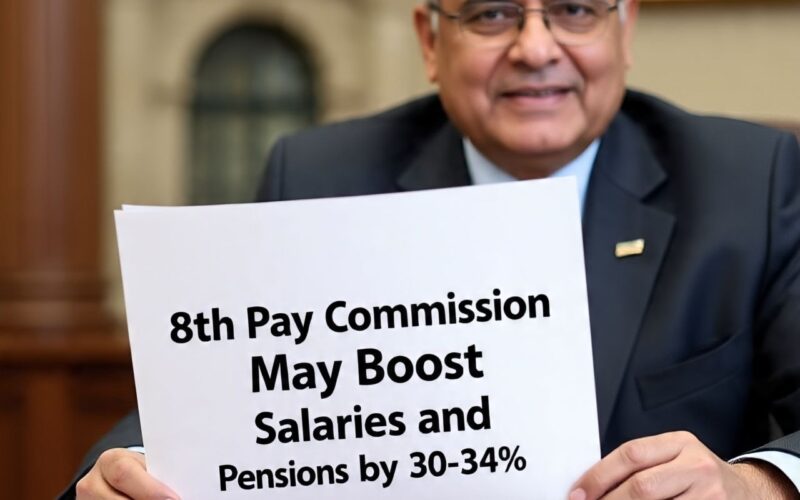#8thPayCommission #GovernmentEmployees #SalaryHike #PensionHike #CentralGovernment #PayCommissionIndia #FitmentFactor #FiscalPolicy
Over 11 million government employees and pensioners likely to benefit; fitment factor under consideration; final decision awaits government approval.
New Delhi: The upcoming 8th Central Pay Commission (CPC) is expected to deliver a significant salary and pension boost for over 11 million beneficiaries, including 4.4 million central government employees and 6.8 million pensioners, according to a report by Ambit Capital, a leading financial services and brokerage firm. If approved and implemented, this move could inject a substantial 30% to 34% hike in salaries and pensions, substantially increasing disposable incomes and potentially driving domestic consumption.
The 8th CPC is poised to replace the 7th Pay Commission, which came into effect in January 2016 and remains applicable till December 2025. Traditionally, pay commissions in India are constituted roughly every ten years to revise and recommend changes in the salary structure of central government employees, ensuring parity with inflation, lifestyle changes, and broader economic indicators.
📈 Expected Salary & Pension Impact: A Break from the Past
The 7th CPC, while bringing in structural rationalisations, was relatively conservative in its financial impact. The fitment factor — the multiple used to calculate revised basic salaries — was fixed at 2.57, and the resulting hike in take-home pay was around 14%, the lowest salary increase since pay commissions began in 1970. The minimum pay was increased from ₹7,000 to ₹18,000 per month, but the Dearness Allowance (DA) was reset to zero, which dampened the actual net hike.
In contrast, the 8th CPC is widely expected to adopt a more expansionary approach, with Ambit Capital estimating a 30–34% rise in salaries and pensions. The projected fitment factor for the upcoming commission is in the range of 1.83 to 2.46, although the final multiplier is subject to government deliberation.
Such a rise could, for example, increase the current basic pay from ₹18,000 to anywhere between ₹24,000 and ₹30,000, depending on the final fitment factor. Given the inflationary environment, rising cost of living, and the consumption-led growth strategy of the government, a more generous revision appears likely.
🕒 Timeline and Implementation Status
While expectations are high, it’s important to note that the government is yet to officially constitute the 8th Pay Commission, and no formal announcement has been made regarding the panel members, terms of reference, or timelines.
According to the Ambit Capital report, the implementation is tentatively scheduled for January 2026, coinciding with the beginning of the next Central Government fiscal cycle. However, any delay in forming the commission could push implementation beyond 2026, which may result in backdated arrears and additional fiscal implications.
Historically, pay commission implementations have also had ripple effects across state governments and public sector undertakings, which often adopt the Central Commission’s recommendations either partially or wholly.
💼 Key Salary Components Under Review
A government employee’s compensation package comprises several components, which the pay commission typically reviews in detail:
-
Basic Pay: The core component, calculated by multiplying the pre-revised basic by the fitment factor.
-
Dearness Allowance (DA): Compensation against inflation, usually revised bi-annually.
-
House Rent Allowance (HRA): Based on city classification, typically ranging from 8% to 24%.
-
Transport Allowance (TA): Varies with job grade and location.
-
Other Allowances: Includes travel, education, medical reimbursement, LTC, and special incentives for hardship postings.
The fitment factor directly influences most of these components, making it the single most critical multiplier in determining the revised salary structure.
📊 Wider Economic and Political Implications
The 8th Pay Commission recommendations, if accepted, could have multi-faceted impacts on the Indian economy:
-
Boost to Consumption: Higher disposable incomes for government employees could spur demand across sectors, particularly in retail, housing, automobiles, and discretionary spending.
-
Inflationary Risk: Additional spending power could lead to price increases, especially in urban centers.
-
Fiscal Implications: The central government wage bill could rise significantly, potentially impacting the fiscal deficit unless balanced by higher revenue inflows.
-
Pension Reforms Pushback: The move could also intensify the Old Pension Scheme (OPS) vs. New Pension Scheme (NPS) debate in states, with several already reverting to OPS citing social security.
From a political standpoint, this also aligns with the run-up to the 2029 general elections, and a substantial salary hike could help galvanize support among government employees, a large and influential voter segment.
🧾 Conclusion
The 8th Pay Commission, though not yet formally constituted, is already shaping expectations among millions of employees and pensioners. With the possibility of a 30-34% salary hike on the horizon, and a fitment factor likely ranging between 1.83 to 2.46, it promises to be a landmark revision, especially when compared to its more muted predecessor.
The coming months will be crucial as the government gears up for its official announcement. For now, the prospect of improved financial well-being has sparked both anticipation and optimism among India’s central government workforce.
📌 Hashtags:
#8thPayCommission #GovernmentEmployees #SalaryHike #PensionHike #CentralGovernment #PayCommissionIndia #FitmentFactor #FiscalPolicy #MutualFundInvestors #IndiaEconomy #AmbitCapital #PublicSectorReforms #DearnessAllowance #HRA #GovernmentJobsIndia #PolicyUpdate #EmployeeBenefits #WageRevision #IndiaInvests #UnionBudget2026

